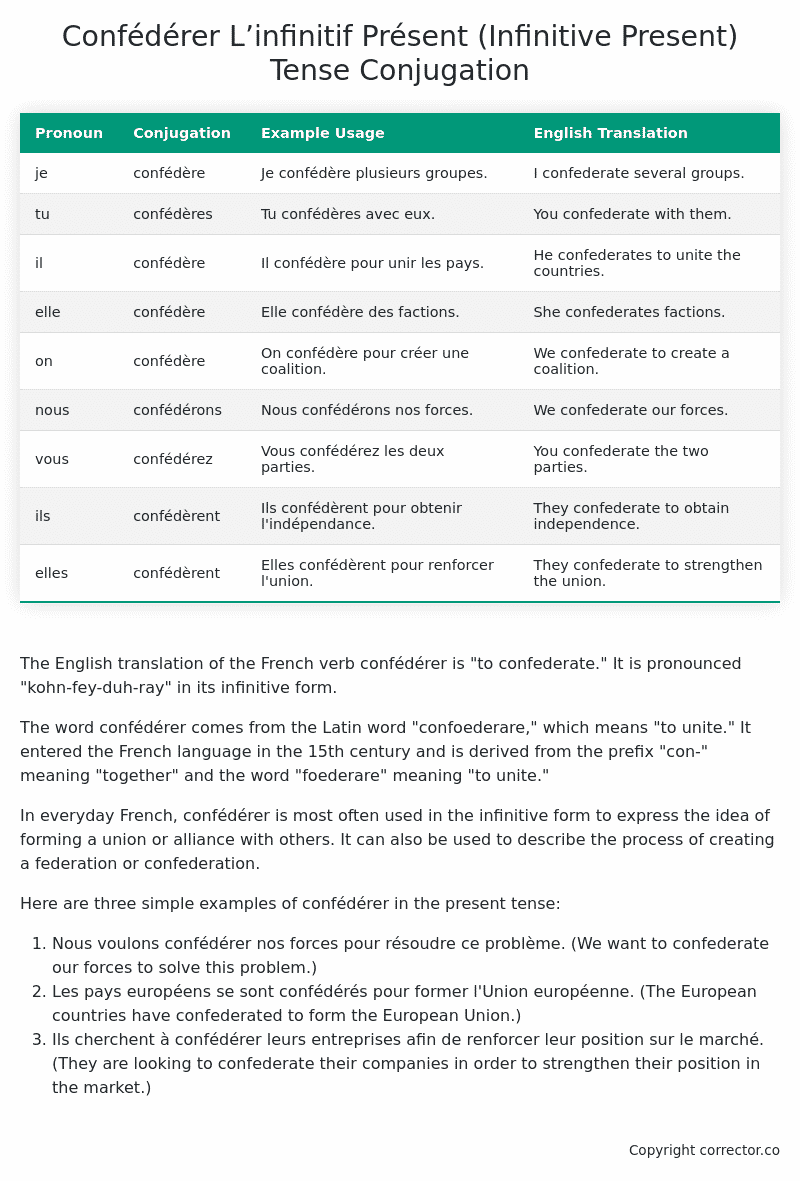L’infinitif Présent (Infinitive Present) Tense Conjugation of the French Verb confédérer
Introduction to the verb confédérer
The English translation of the French verb confédérer is “to confederate.” It is pronounced “kohn-fey-duh-ray” in its infinitive form.
The word confédérer comes from the Latin word “confoederare,” which means “to unite.” It entered the French language in the 15th century and is derived from the prefix “con-” meaning “together” and the word “foederare” meaning “to unite.”
In everyday French, confédérer is most often used in the infinitive form to express the idea of forming a union or alliance with others. It can also be used to describe the process of creating a federation or confederation.
Here are three simple examples of confédérer in the present tense:
- Nous voulons confédérer nos forces pour résoudre ce problème. (We want to confederate our forces to solve this problem.)
- Les pays européens se sont confédérés pour former l’Union européenne. (The European countries have confederated to form the European Union.)
- Ils cherchent à confédérer leurs entreprises afin de renforcer leur position sur le marché. (They are looking to confederate their companies in order to strengthen their position in the market.)
Table of the L’infinitif Présent (Infinitive Present) Tense Conjugation of confédérer
| Pronoun | Conjugation | Example Usage | English Translation |
|---|---|---|---|
| je | confédère | Je confédère plusieurs groupes. | I confederate several groups. |
| tu | confédères | Tu confédères avec eux. | You confederate with them. |
| il | confédère | Il confédère pour unir les pays. | He confederates to unite the countries. |
| elle | confédère | Elle confédère des factions. | She confederates factions. |
| on | confédère | On confédère pour créer une coalition. | We confederate to create a coalition. |
| nous | confédérons | Nous confédérons nos forces. | We confederate our forces. |
| vous | confédérez | Vous confédérez les deux parties. | You confederate the two parties. |
| ils | confédèrent | Ils confédèrent pour obtenir l’indépendance. | They confederate to obtain independence. |
| elles | confédèrent | Elles confédèrent pour renforcer l’union. | They confederate to strengthen the union. |
Other Conjugations for Confédérer.
Le Present (Present Tense) Conjugation of the French Verb confédérer
Imparfait (Imperfect) Tense Conjugation of the French Verb confédérer
Passé Simple (Simple Past) Tense Conjugation of the French Verb confédérer
Passé Composé (Present Perfect) Tense Conjugation of the French Verb confédérer
Futur Simple (Simple Future) Tense Conjugation of the French Verb confédérer
Futur Proche (Near Future) Tense Conjugation of the French Verb confédérer
Plus-que-parfait (Pluperfect) Tense Conjugation of the French Verb confédérer
Passé Antérieur (Past Anterior) Tense Conjugation of the French Verb confédérer
Futur Antérieur (Future Anterior) Tense Conjugation of the French Verb confédérer
Subjonctif Présent (Subjunctive Present) Tense Conjugation of the French Verb confédérer
Subjonctif Passé (Subjunctive Past) Tense Conjugation of the French Verb confédérer
Subjonctif Imparfait (Subjunctive Imperfect) Tense Conjugation of the French Verb confédérer
Subjonctif Plus-que-parfait (Subjunctive Pluperfect) Tense Conjugation of the French Verb confédérer
Conditionnel Présent (Conditional Present) Tense Conjugation of the French Verb confédérer
Conditionnel Passé (Conditional Past) Tense Conjugation of the French Verb confédérer
L’impératif Présent (Imperative Present) Tense Conjugation of the French Verb confédérer
L’infinitif Présent (Infinitive Present) Tense Conjugation of the French Verb confédérer (this article)
Struggling with French verbs or the language in general? Why not use our free French Grammar Checker – no registration required!
Get a FREE Download Study Sheet of this Conjugation 🔥
Simply right click the image below, click “save image” and get your free reference for the confédérer L’infinitif Présent tense conjugation!

Confédérer – About the French L’infinitif Présent (Infinitive Present) Tense
Forming the Infinitive Present
Common Everyday Usage Patterns
As a Verb’s Dictionary Form
After Modal Verbs
As an Imperative
In Infinitive Clauses
Interactions with Other Tenses
Present Tense
Future Tense
Conditional Tense
Passé Composé
Imperfect Tense
Subjunctive and Conditional Moods
Summary
Want More?
I hope you enjoyed this article on the verb confédérer. Still in a learning mood? Check out another TOTALLY random French verb conjugation!


